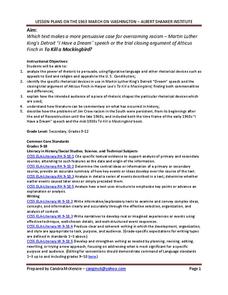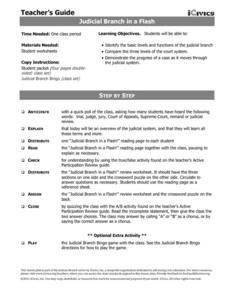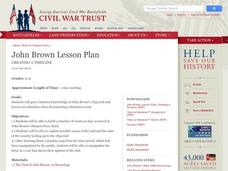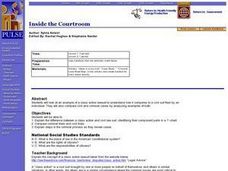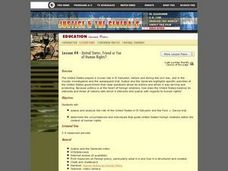Curated OER
For The Sake Of Security: U.S.A. Patriot Act & Bill of Rights
A substantive New York Times article about the U.S.A. Patriot Act, military tribunals, racial profiling, and the Bill of Rights forms the basis for a discussion of the complex interplay of fundamental American rights and the aftermath of...
Albert Shanker Institute
Making the Case for Equality: A Comparison
Martin Luther King Jr's " I Have a Dream" speech and Atticus Finch's closing argument during the trial of Tom Robinson both address the societal need to overcome racism. After examining the rhetorical devices and figurative language used...
iCivics
Judicial Branch in a Flash
What is the difference between the federal court and state court systems? What about criminal versus civil cases? Check out this resource that will offer your class members a general and effective overview of the judicial branch in the...
Constitutional Rights Foundation
Criminal Justice in America
The allure of true crime television shows often leads to intrigue of the criminal justice system. Using a six-unit curriculum, learners explore criminology and the justice system in the United States. Topics include the police, trial...
Curated OER
African-American Soldiers After World War I: Had Race Relations Changed?
Students utilize an online database to conduct research and analyze the conditions for African-Americans before and after World War I. They consider the role of the 92nd and 93rd divisions in affecting social change.
Curated OER
John Brown Lesson Plan
Students create timelines of the Harper's Ferry Raid. In this Civil War lesson, students analyze information and music related to John Brown and his abolitionist work. Students design timelines that document the events that led to and...
Curated OER
The Art of Nonviolence: Martin Luther King, Jr., Gandhi, and Concepts of Nonviolence in Indian Art
Young scholars make connections between nonviolent ideals and art. In this visual arts lesson, students discuss the successes of the American Civil Rights Movement and discuss Gandhi's influence on the movement. Young scholars then...
Curated OER
Lincoln and the "Writ of Liberty"
Students debate and explore the rationale and ethics behind Lincoln's 19th century suspension of habeas corpus - the 'writ of liberty' and answer related questions.
Curated OER
In The Words of Abraham Lincoln...
High schoolers explore the words of Abraham Lincoln. In this Abraham Lincoln lesson, students analyze segments of "The Gettysburg Address," his annual address to Congress in 1862, and his letter to Mrs. Bixby. High schoolers conduct...
Curated OER
Rights and Responsibilities, Is It Breaking the Law?
Students investigate the life and trial of Rev. John Mahan who was involved with the illegal Underground Railroad. The issue of breaking the law to help slaves escape is examined in this lesson.
Judicial Learning Center
The Players in the Courtroom
Courtrooms are complicated. In addition to the many rules, there are a number of people whose jobs are not very clear to the casual courtroom observer. With the resource, individuals identify some of these roles and review more...
Facing History and Ourselves
Emmett Till: Choosing to Remember
Mamie Till, the mother of Emmett Till and civil rights activist, believed that her son's murder was the last straw before public outrage over racial injustice spilled over into the Civil Rights Movement of the 20th century. A history...
Facing History and Ourselves
Emmett Till: Connecting the History of Lynching to The Murder
Though the murder of Emmett Till shocked 1950's America into turning attention to the racial crimes of the South, it was far from the first time racism had erupted into violence. High schoolers examine the killing in context with the...
Facing History and Ourselves
Emmett Till: Confronting the Murder
The 1955 murder of Emmett Till is often regarded as the catalyst for the Civil Rights Movement of the 20th century. Learn more about the brutal crime—and, as many believe, the miscarriage of justice—that began a national conversation...
Curated OER
Coca Cola vs. People of India
Students study the presence of Coca Cola in India and what it has done to the water supply there. Students research web articles. They compare and contrast diverse cultural points of view. Students participate in a mock trial to...
Curated OER
Inside the Courtroom
Twelfth graders explain the difference between a class action and civil law suit. In groups, they compare and contrast criminal and civil trials and review various cases. They determine the place of law in the American constitutional...
Curated OER
Mohandas Gandhi
In this online interactive history quiz activity, students respond to 50 multiple choice questions about the accomplishments of Mohandas Gandhi. Students may submit their answers to be scored.
Curated OER
Reconstruction (1865–1877)
In this online interactive history quiz worksheet, students respond to 50 multiple choice questions about the Reconstruction Era. Students may submit their answers to be scored.
iCivics
We the Jury
Learners take on the roles of jurors in a civil case to evaluate evidence and determine a verdict in this engaging online interactive experience.
Curated OER
How Long is Too Long?
Students examine the legal term statute of limitations and how it varies based on the type of criminal or civil activity under discussion. They discern the applicable statute of limitations given an hypothetical or actual situation and...
Curated OER
Ira Ritter, Et Al., V. Jerry And Ruth Stanton Lesson 2: What Does a Jury Do Anyway?
Students investigate how a jury is chosen, and what the rights and responsibilities of juries are. They examine case studies to determine the role of the jury in both criminal and civil cases.
Curated OER
That's MY Pencil: Simplified Mock Trial
Learners identify the process for settling a legal dispute, identify key players in a legal dispute (who presents the facts; who makes the final decision), and determine what makes a decision fair.
Curated OER
Tolerance in Times of Trial
Learners view the treatment of people of Japanese and German descent during World War II. They explore the problems in assigning blame to populations during times of war. They identify modern examples of discrimination and stereotyping.
Curated OER
Justice & The Generals: Education - Lesson Plan 4 - United States: Friend or Foe of Human Rights? | PBS
High schoolers asses and analyze the role of the United States in El Salvador and the Ford v. Garcia trial. They determine the circumstances and individuals that guide United States foregin relations within the context of human rights.



